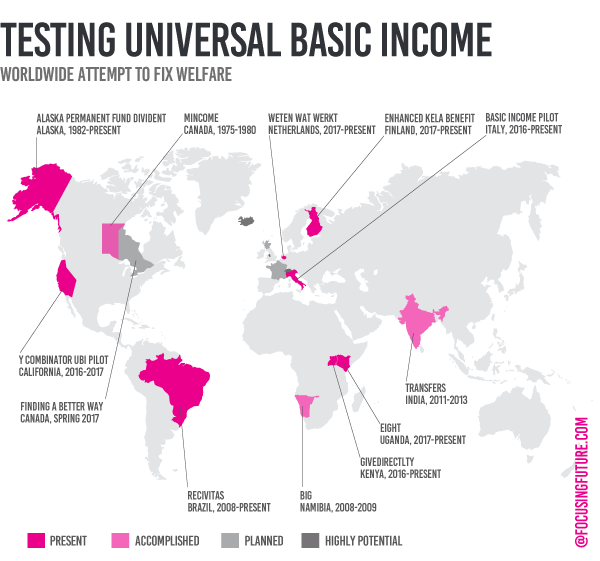![]() 7 minute read
7 minute read
Universal Basic Income is one of the hottest topics of the 21st century. Having Unconditional Income sounds exciting for citizens, while scares politicians. This extreme and expensive step might be the only solution for the future of work and survival. This article explores the idea of basic income, its effect on equality including gender perspective, raise of entrepreneurship and shift of employees’ attitude, and international aspect of the new welfare system.
The clock
is ticking
The Universal Basic Income is a simplified and more transparent welfare system that can reduce the cost of welfare while improving economic activity. The idea is far from new. The guaranteed income was advocated by Thomas Paine in the 18th century: “There shall be paid to every person, when arrived at the age of twenty-one years, the sum… as a compensation in part, for the loss of his or her natural inheritance, by the introduction of the system of landed property…to every person, rich or poor… because it is in lieu of the natural inheritance, which, as a right, belongs to every man, over and above the property he may have created, or inherited from those who did.”
Nowadays, when the labor market is in danger with the projection that at least 7% of human work in 2020 will be substituted with robotics, the new welfare system is a logical step forward for the societal shift. Bill Gates argues that while the idea is great, the world might not be ready to implement it. “Over time, countries will be rich enough to do this. However, we still have a lot of work that should be done — helping older people, helping kids with special needs, having more adults helping in education,” said Gates at AMA on Reddit. Thus, there is a number of ongoing Universal Basic Income experiments to shed light on its process and outcome.

Adding the
gender perspective
One of Basic Income’s merits is giving similar opportunities to everyone and equalizing the society regardless individual inheritance. For poorer people or people without income, like stay-at-home moms, the basic income covers essentials like healthcare and food. According to Patricia Schulz, a Swiss lawyer and specialist in international human rights and gender equality, Universal Basic Income enormously contributes to the equality and empowers women. Patricia argues that “as most social security systems are (still) based on contributions linked to remunerated work, independent or salaried, the inferior income of women, their restriction to part-time jobs as well as the interruptions in their careers due to care responsibilities will directly impact the level of social protection they can expect in case of old age, disability, illness and so on, as well as expose them to depend on a partner and/or the (welfare) state.” She underlines the issue of the developed countries with the gender wage gap. As women earn less during the life, consequently their pensions are lower than that of men’s. Nevertheless, latest statistic shows that salary gap is shrinking for youth under 25 years old. Therefore, hopefully, Patricia’s argument will stay true for current generation only.
An even more dramatic situation is in the countries where inequality is such that women do not have an independent income and are totally dependent on the earner. Basic Income Earth Network has conducted Basic Income experiment in nine Indian villages proving unconditional grants. It has reportedly empowered women giving them a sense of control over money. As a result, debts in those communities were significantly reduced, nutrition, sanitation, and school attendance among children were noticeably improved. Another experiment, Basic Income Granit in Namibia, has decreased child malnutrition and increased healthcare clinic use. It has also been reported that during the field, more children have visited schools and fewer people engaged in criminal activity.
Future of work
and entrepreneurship
There are contradictory opinions on how people will use an extra income and where the funding for basic income will come from. Some experts question whether people will work at all. This group of thinkers lack the understanding that while there is always a standard deviation, most of the people are ambitious and prefer to develop themselves. For example, experiment in London showed that granting free money to homeless people helps at least half of them to find a job and accommodation in one year. That means that basic income can empower poor and homeless people, reduce crime rates and police expenditure.
When the labor market is endangered by having every third worker as a robot, especially in large corporations that can afford the investment, people turn more to establishing their own business. In theory, Universal Basic Income reduces the risk of opening own business and thus nudges to follow the dream and turn a beloved hobby into a profitable firm. For the longest time, HRs have been advocating to provide employees with own space and allow them to bring own perspective and interests into daily tasks. They argue that this way will increase productivity and innovation. The Basic Income will most probably grant the ball into employees hands allowing them either leveraging own job description or establishing own enterprise. Altogether, it will boost economy development and the money exchange on the market.
But what working people will do with the monthly extra income? Some people say that they would invest part of “free money” to build and sustain a local community with farming or other activities. Moreover, the idea to spend part of extras on children, elderly, education or community, is one of the most popular. If each citizen contributes some amount of basic income into local developments, it will also generate new businesses. On a recent episode of the podcast Freakonomics Radio, Sam Altman, the president of the incubator Y Combinator that funds research on universal basic incomes, said “Maybe 90 percent of people will go smoke pot and play video games, but if 10 percent of the people go create new products and services and new wealth, that’s still a huge net win.” Having a sure monthly cash flow gives space for creativity which is impossible for a robotic world.
International relationship
of basic income
Countries all over the world are attempting to enhance their welfare with Basic Income. However, each of them is trying its own original way of the provision of guaranteed money flow. For example, Basic Income in Finland and India is vastly different. Amantya Sen, a recipient of the 1998 Nobel Prize in Economics, even argues that India is not ready for such a step, as a country has not yet “reached the level of prosperity that Europe has”. Internationally countries have to account for a possible increase of immigration to places with more attractive solutions. Today, there is a global economy, global ecology, and it is time to move from national to global politics as well. The 21st century has to bring a solution that will work for global community with a new market of work and consumerism.




